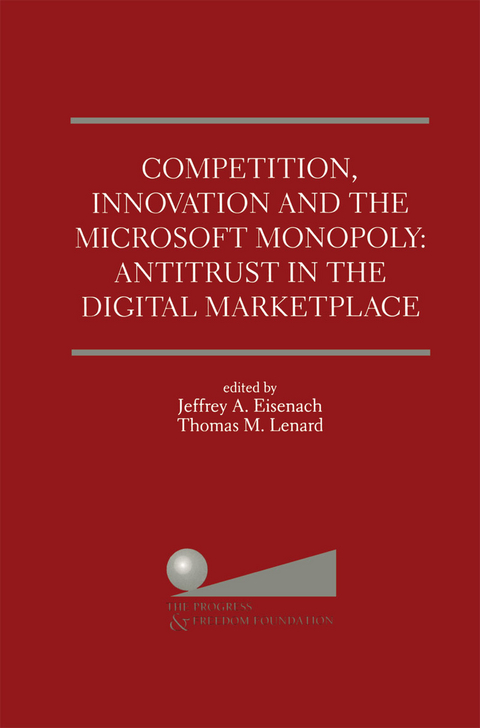
Competition, Innovation and the Microsoft Monopoly: Antitrust in the Digital Marketplace
Proceedings of a conference held by The Progress & Freedom Foundation in Washington, DC February 5, 1998
Seiten
2012
|
Softcover reprint of the original 1st ed. 1999
Springer (Verlag)
978-94-010-5894-0 (ISBN)
Springer (Verlag)
978-94-010-5894-0 (ISBN)
Do the antitrust laws have a place in the digital economy or are they obsolete? Instead, they offer insights - for policymakers, courts, practitioners, professors and students of antitrust policy everywhere - on how antitrust analysis can be applied to the business of making and marketing computer software.
Do the antitrust laws have a place in the digital economy or are they obsolete? That is the question raised by the government's legal action against Microsoft, and it is the question this volume is designed to answer.
America's antitrust laws were born out of the Industrial Revolution. Opponents of the antitrust laws argue that whatever merit the antitrust laws may have had in the past they have no place in a digital economy. Rapid innovation makes the accumulation of market power practically impossible. Markets change too quickly for antitrust actions to keep up. And antitrust remedies are inevitably regulatory and hence threaten to `regulate business'.
A different view - and, generally, the view presented in this volume - is that antitrust law can and does have an important and constructive role to play in the digital economy. The software business is new, it is complex, and it is rapidly moving. Analysis of market definition, contestibility and potential competition, the role of innovation, network externalities, cost structures and marketing channels present challenges for academics, policymakers and judges alike. Evaluating consumer harm is problematic. Distinguishing between illegal conduct and brutal - but legitimate - competition is often difficult.
Is antitrust analysis up to the challenge? This volume suggests that antitrust analysis `still works'. In stark contrast to the political rhetoric that has surrounded much of the debate over the Microsoft case, the articles presented here suggest neither that Microsoft is inherently bad, nor that it deserves a de facto exemption from the antitrust laws. Instead, they offer insights - for policymakers, courts, practitioners, professors and students of antitrust policy everywhere - on how antitrust analysis can be applied to the business of making and marketing computer software.
Do the antitrust laws have a place in the digital economy or are they obsolete? That is the question raised by the government's legal action against Microsoft, and it is the question this volume is designed to answer.
America's antitrust laws were born out of the Industrial Revolution. Opponents of the antitrust laws argue that whatever merit the antitrust laws may have had in the past they have no place in a digital economy. Rapid innovation makes the accumulation of market power practically impossible. Markets change too quickly for antitrust actions to keep up. And antitrust remedies are inevitably regulatory and hence threaten to `regulate business'.
A different view - and, generally, the view presented in this volume - is that antitrust law can and does have an important and constructive role to play in the digital economy. The software business is new, it is complex, and it is rapidly moving. Analysis of market definition, contestibility and potential competition, the role of innovation, network externalities, cost structures and marketing channels present challenges for academics, policymakers and judges alike. Evaluating consumer harm is problematic. Distinguishing between illegal conduct and brutal - but legitimate - competition is often difficult.
Is antitrust analysis up to the challenge? This volume suggests that antitrust analysis `still works'. In stark contrast to the political rhetoric that has surrounded much of the debate over the Microsoft case, the articles presented here suggest neither that Microsoft is inherently bad, nor that it deserves a de facto exemption from the antitrust laws. Instead, they offer insights - for policymakers, courts, practitioners, professors and students of antitrust policy everywhere - on how antitrust analysis can be applied to the business of making and marketing computer software.
1 Introduction and Overview.- 2 Antitrust in the Digital Age.- 3 Antitrust in Software Markets.- 4 Is Heightened Antitrust Scrutiny Appropriate for Software Markets?.- 5 Using Leverage to Preserve Monopoly Discussion of Katz and Shapiro Paper.- 6 Access and Bundling in High-Technology Markets.- 7 Comment on Ordover and Willig.- 8 Microsoft And Browsers: Are the Antitrust Problems Really New?.- 9 New Modes of Competition: Implications for the Future Structure of the Computer Industry.- 10 Competition, Compatibility, and Vertical Integration In the Computing Industry.- 11 Microsoft’s Use of Zero Price Bundling to Fight the “Browser Wars ”.- 12 Digital Convergence?.- 13 Comment on Flamm.
| Zusatzinfo | 1 Illustrations, black and white; X, 297 p. 1 illus. |
|---|---|
| Verlagsort | Dordrecht |
| Sprache | englisch |
| Maße | 155 x 235 mm |
| Themenwelt | Recht / Steuern ► EU / Internationales Recht |
| Wirtschaft ► Betriebswirtschaft / Management ► Unternehmensführung / Management | |
| Wirtschaft ► Volkswirtschaftslehre ► Makroökonomie | |
| ISBN-10 | 94-010-5894-6 / 9401058946 |
| ISBN-13 | 978-94-010-5894-0 / 9789401058940 |
| Zustand | Neuware |
| Haben Sie eine Frage zum Produkt? |
Mehr entdecken
aus dem Bereich
aus dem Bereich
wie man Menschen wirklich weiterbringt
Buch | Softcover (2024)
Vahlen (Verlag)
26,90 €
Buch | Softcover (2023)
Springer Gabler (Verlag)
32,99 €
ein Navigationssystem für Führungskräfte
Buch (2023)
Carl-Auer Verlag
34,95 €


